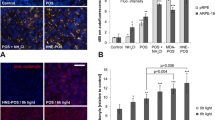Abstract
Lipid peroxidation has been implicated in many age-associated disorders including macular degeneration of the retina. We sought to elucidate the mechanism by which accumulation of oxidized LDL (oxLDL) reduces the ability of retinal pigment epithelium (RPE) to process photoreceptor outer segments (OS) as a model of peroxidation-induced disruption of phagocytosis. OxLDL did not reduce the lysosomal hydrolytic capacity of the RPE, but efficiently inhibited processing of various internalized proteins. OxLDL caused a delay in the acquisition of late lysosomal markers by newly formed phagosomes. At the same time, an excessive accumulation of markers of early phagosomal compartments was also observed. The activity of phosphatidylinositol 3-kinase (PI3K) was reduced in phagosomes of the RPE treated with oxLDL. These results suggest that accumulation of oxidized lipid-protein complexes in the RPE impedes phagosome maturation by blocking PI3K recruitment to the phagosomal membrane, leading to delayed processing of internalized OS.
Similar content being viewed by others
Author information
Authors and Affiliations
Corresponding author
Additional information
Received 24 February 2004; received after revision 12 April 2004; accepted 4 May 2004
Rights and permissions
About this article
Cite this article
Hoppe, G., O’Neil, J., Hoff, H.F. et al. Accumulation of oxidized lipid-protein complexes alters phagosome maturation in retinal pigment epithelium. CMLS, Cell. Mol. Life Sci. 61, 1664–1674 (2004). https://doi.org/10.1007/s00018-004-4080-5
Issue Date:
DOI: https://doi.org/10.1007/s00018-004-4080-5




